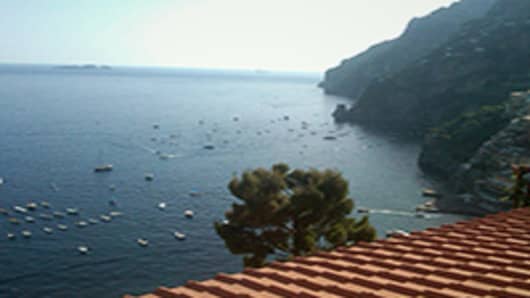A professional driver hired by Italian corporations was getting ready for a large Dolce and Gabanna show in Sicily: he said business had been good. He acknowledged everyone was worried about the economy but admitted the restaurants were indeed full, and not just with tourists. Romans, at least, were still not willing to let go of La Dolce Vita.
"It's a mystery," he said as he weaved his way around the Piazza del Popolo.
At of-the-moment restaurants like Assunta Madre and Gallura, where trendy Romans and a smattering of tourists picked out fish for dinner that had been in the ocean eight hours before (sumptuously displayed on ice), the tables were full of women with perfect tans wearing the splashy, colorful sundresses that are in all the shops.
The Prada store just off the Spanish Steps was packed with a polyglot crowd of Middle Eastern women in headscarves squeezing into $800 pairs of trendy shoes, skinny 20-something Euro-trust fund babies ogling '60s retro-style sundresses and pants, and middle-aged women looking for bright-colored handbags to spice up their eveningware for dinner that night. Sixties-era Bob Dylan played while the cash registers rang.
In Ostia, the famous seaport town where Romans go for their lengthy July and August holidays, the beaches were packed. The partying had been so intense in the main square late into the night that residents have hung banners off the balconies declaring "No More Music!"
But scratch a bit further below the surface: business is uneven, at best.
A lawyer from Rome who was taking a few days off with his wife could not get a room at the San Pietro in Positano, arguably the best hotel in southern Italy.
"But that is just at the highest end, the very wealthiest," he said as he worked on his laptop in the lobby of our hotel. "For everything else, business is lower than last year, even the tourist business."
In Positano, a cliffside town on the Amalfi Drive about an hour south of Naples, the trendy restaurants on the harbor had vacant tables at 9pm on a Friday night. A waitress—an American girl majoring in Hospitality for a Florida university who was spending the summer working in the town—said the locals had remarked that business was notably lighter than last year, an opinion shared by barmen and taxi drivers elsewhere.
In Capri, the famous island off the coast of Sorrento, a barman said that business was "only so-so..there are fewer Italians, fewer Americans, fewer everyone" than last year.
In Pompei, the town just south of Naples buried by an eruption of Mount Vesuvius in 79 AD, the tour guides were despondent. Business had slowed dramatically since 2008 and was down from last year; the northern Italians who used to be their most reliable customers had all but disappeared. The Germans were still showing up, and a smattering of Americans, but everyone else was in short supply.
Like every Italian I had spoken with, the Pompeian tour guide also expressed support for Mario Monti—but only grudgingly. "Under Monti, we are all paying more taxes. That is all we see so far."
Monti seems well aware of this sentiment. He had just agreed on a package of spending cuts that would avoid another round of tax hikes—for the moment.
The guide said he was surviving on his reduced income and higher taxes, but just barely. And he was worried—he actually said he was "fearful"—about the future.
"There is no faith in politicians any more," he said as he looked down a mostly empty excavated street that led to the amphitheater. He said the most popular politician in the country was comedian Beppe Grillo, whose Five Star Movement had recently polled well in local elections, despite having almost no coherent platform other than a rejection of the euro and all politicians.
"If he ran today, he would win," the guide said. He walked away to go to the ticket office to see if he could scare up more customers, but it didn't work: the ticket office was closed temporarily because the computer that spit out the tickets wasn't working. Rather than write tickets by hand, the ticket takers had shut down the office and told visitors to wait or walk a half-mile to the next gate.
"This is Italy today," he said, shaking his head. "Too much bureaucracy, too hard to make things work."
Indeed, aside from the taxes, the second most common complaint was the presence of mind-numbing bureaucracy and inefficiency.
If you want to experience it, try renting a car at Rome's Fiumicino Airport. The rental office was in a cramped corridor with no seats and no lines; hundreds were milling about wondering what to do. I was number 122; the five people at the counter had just started with 81. An American standing next to me—he was 117—said to his friend, "If this was Germany, this would be completely different. There'd be a line, there'd be a woman making sure you were standing in the line, and that woman would be making sure there were enough people at the counter to get everyone out in a few minutes."
Two hours later, I finally got my keys. When I asked the lady at the counter if this was typical, she waved her hand at the five people at the counter and the hundred or so standing around waiting and said, "I am ready to go to the hospital."
Finally, the despondent tour guide I spoke to in Pompei should take some heart: we have seen more Chinese tourists. Italian media has been reporting that Italian consulates in China issued 40 percent more visas for the first quarter of 2012. Visas were up for Brazilians and Russians as well.
Of course, most Italian tour guides do not speak Mandarin.
_____________________________
Bookmark CNBC Data Pages:
_____________________________
Want updates whenever a Trader Talk blog is filed? Follow me on Twitter: twitter.com/BobPisani.
Questions? Comments? tradertalk@cnbc.com



